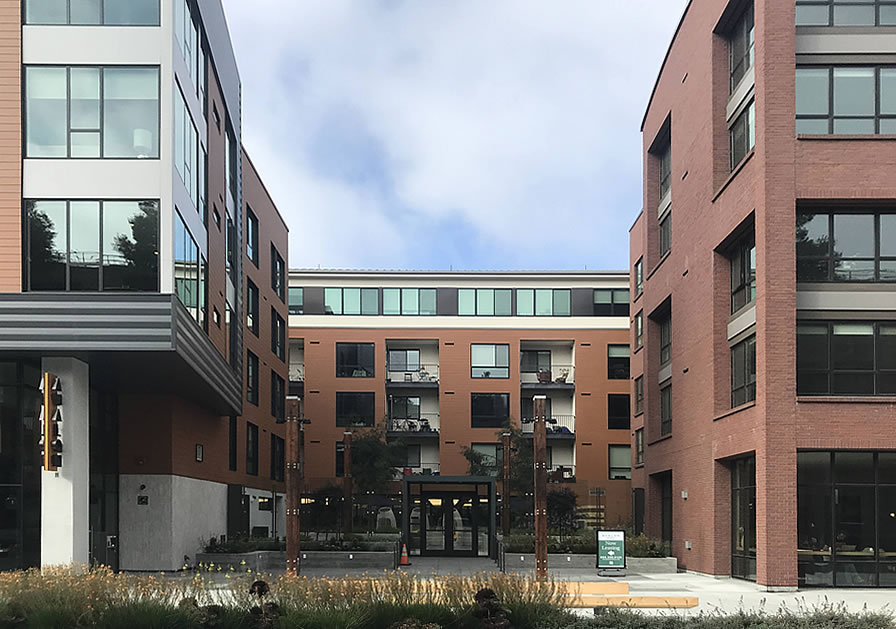Having dropped in 2017, the weighted average asking rent for an apartment in San Francisco and Oakland ticked up in 2018 but both markets remain below peak.
Including one-off rentals, as well as those in larger developments, the average asking rent for an apartment in San Francisco is now running around $4,130 a month, which is roughly 3 percent above its mark at the same time last year but remains around 7 percent below its peak in the fourth quarter of 2015 with the average asking rent for a one-bedroom now running around $3,550 a month.
At the same time, the weighted average asking rent for an apartment in Oakland is now running around $2,725 a month, which is roughly 9 percent above its mark at the same time last year but 9 percent below its peak in the second quarter of 2016, with the average asking rent for a one-bedroom running around $2,400 a month (which is now 32 percent less expensive than in San Francisco versus 35 percent less expensive than San Francisco at the same time last year).
Our trends analysis is based on pricing data from over 3,100 comparable listings on a year-over-year basis alone.

So, rents are up while the real estate market is softening?!? Does anyone have a good take on this? I know one could invoke interest rate hikes as a possible reason, but interest rates are not much higher than they were in the first half of 2018 when real estate prices were rising.
My best explanation is that the recent stock market declines have lowered the purchasing power of many prospective buyers (esp. techies with large chunks of their wealth tied up in FB or Google stock options). At the same time, the job market is still very strong and the supply of new housing has not increased much. This is why rents are still appreciating.
If buyers are waiting on the sidelines, rents can increase while prices fall.
Average and median rents can also increase when actual rents are falling. If people are trending to the lower priced places, there will be more higher priced places for rent, which would skew the average up. In another example, when markets turn down, landlords are more apt to fix up an older place that isn’t renting: even though rents can be falling for the same place, the average would then increase because more are fixed up, even though rents for the same place are falling, and in fact landlords are more likely to do this when rents are falling than when they are rising. In the case of Oakland, if a number of new buildings are being rented for the first time, that can sharply skew the average up if most of the existing stock is old and outdated, even if prices in general are falling. I’m not seeing rents falling, the above are just hypotheticals.
I track rents in larger complexes in SF and they seem to be up about 2-3% on an apples to apples basis from last year. Basically just hitting inflation increases.
Additionally, if, say, hypothetically, interest rates rose from 4% to 4.5% (ridiculous, I know), and property taxes went up 30%, and just for the heck of it, let’s also assume for worst case that the cap on mortgage deductions went down by 25%, I’d expect property prices to fall. I realize how unlikely all of these things are, but that would be another rare case where the economy was doing fine, but prices fell. In a city that had lots of people with apartments they only use a few times per year, that they bought when interest rates were low, the sudden increase in taxes that would only be realized this April, would be another reason for an even worse decline. And if adjustable rate mortgages shot up by 35%, well, that would be almost a perfect storm. In that case, rents would be up, and property prices down.
If we added in a stock price decline in an area that is dependent on stock prices, well, that would be almost unthinkable. But of course, all of this is pure speculation: unimaginable all would happen at once, etc. Palo Alto prices will NEVER decrease by $2M in two years. Will. Not. Happen.
Psychology- many people don’t want to buy into a weakening market, so they adopt a wait-and-see attitude, which means renting in the meantime. Stock- lots of nice new buildings completed recently, allowing people to trade up and out of less than ideal living situations they entered under duress 2012-2016.
And when real estate market softens would- be home buyers sit on the side lines. They rent and wait it out. So more demand for rental housing – plus techies are just passing through and sometimes don’t stay in one place/city long which keeps rentals turning over. Lots of new jobs happening in Oakland with Square taking over the old Sears building. Alot of factors on a hyper local level.
855 Brannan?